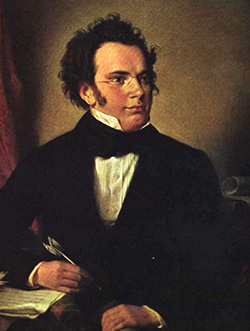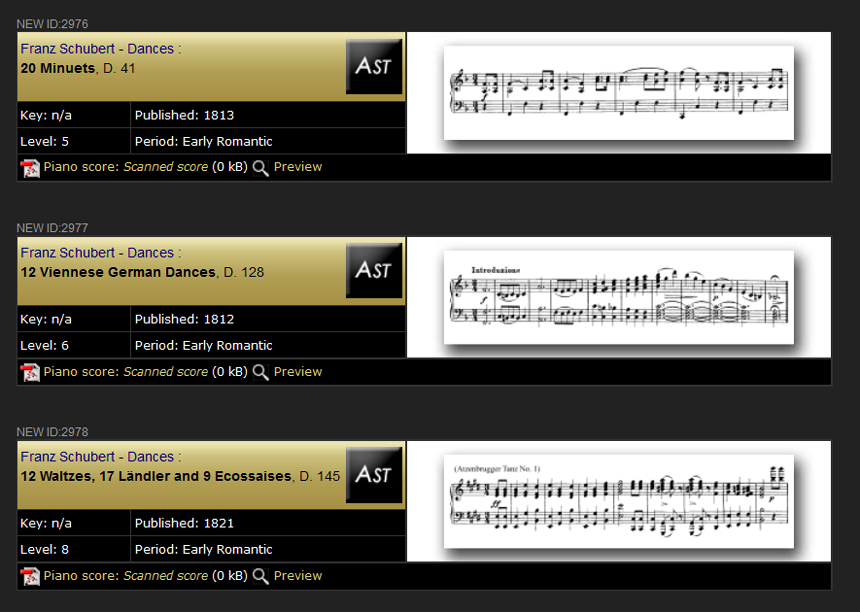The Complete Piano Music by Franz Schubert
 Unlike Mozart, Beethoven, Liszt or Chopin, Schubert was not a keyboard virtuoso. He played the piano only in the intimate gatherings known as Schubertiads. Nevertheless, he is certainly one of the greatest composers for piano, exploring the expressive potential of the keyboard in a succession of masterpieces for solo piano, piano duet, chamber music and song accompaniment. Therefore, it’s an event worth celebrating when Piano Street now publish his dances as well as his complete piano sonatas, which in addition to the previously available selection of Impromptus, Moments Musicaux and many other pieces give you the complete picture of Schubert as a composer for the piano.
Unlike Mozart, Beethoven, Liszt or Chopin, Schubert was not a keyboard virtuoso. He played the piano only in the intimate gatherings known as Schubertiads. Nevertheless, he is certainly one of the greatest composers for piano, exploring the expressive potential of the keyboard in a succession of masterpieces for solo piano, piano duet, chamber music and song accompaniment. Therefore, it’s an event worth celebrating when Piano Street now publish his dances as well as his complete piano sonatas, which in addition to the previously available selection of Impromptus, Moments Musicaux and many other pieces give you the complete picture of Schubert as a composer for the piano.
The charming miniatures
The numerous dances now made available on our site are simple, graceful and melodic works, of which many are suitable for the intermediate player.

The dance was a part of Schubert’s output throughout his life. His ability to compose a steady stream of these charming miniatures contributed to what little public recognition and income he had; on the other hand, almost none of Schubert’s larger piano works were published during his lifetime. The sonatas were, if not a well-kept secret, practically unknown to the larger public.
The secret, great works

Between 1815 and 1828, Schubert began work on 23 piano sonatas. Of these, he only completed fourteen. The nine unfinished ones fall into three different categories: 1) fragments of sonata movements that break off after the exposition; 2) sonatas that seem more or less complete but where one or more movements might be missing; 3) sonatas that have unfinished movements. Some of these movements, where Schubert stopped writing at the point of recapitulation, can be considered complete in the sense that all the musical material needed is present – to finish them all you need to do is to repeat the exposition with the necessary adjustments (transposing secondary themes etc), possibly including a coda.
This raises a lot of questions for both editors and performers. Which works should be included in a “complete” edition of the sonatas, and in what order are they to be presented? Can incomplete sonata movements be performed at all? If you perform them, should you stop playing where Schubert left off or compose your own ending?
So, how many sonatas are there?
The most authoritative scholarly edition so far, Bärenreiter’s Neue Schubert Ausgabe (1996-2003), numbers 19 sonatas. However, the numbering encountered in most recordings and on most web pages listing Schubert works, runs to 21. Piano Street adopts this numbering and includes 21 works in our collection of Schubert sonatas.
To the sonatas that seem to lack one or more movements, we have added movements that have been repeatedly suggested by scholars and which are often included in recordings and performances. For example, the Sonata in E minor, D.566, may have been intended by Schubert as a two-movement sonata (I. Moderato- II. Allegretto) although a Scherzo was written into the same manuscript. In this case, Piano Street publishes the Scherzo as well as a fourth movement, the Rondo in E major, D.506. This piece was suggested as the missing fourth movement as early as 1905, and has been included in several urtext editions of the complete sonatas.
Movements that have been handed down in incomplete form are published as fragments. We leave it to the performer to decide whether to leave off where Schubert did, or to try to complete the movement.
Enjoy the new publications and become an expert in the piano music of Franz Schubert!
We are happy to be able to present an even more complete and useful Schubert piano sheet music library and wish you many happy hours exploring the great masterworks for piano by Franz Schubert.
All pieces are available to instantly dowload and print but not least to study or just enjoy in Piano Street’s unique Audiovisual Study Tool.
Reader question:
Which is your favourite piano work by Franz Schubert?
Please post your answer and comments below.
Comments
Drei Klavierstucke.
Schubert Impromptu op 90 #3. Especially love the performance by Horowitz in Vienna on youtube.
D959
Sonata D.958
Impromptu 899 no 4
fell in love with this one the moment i first heard it. committed myself to learning it and it has brought me much joy ever since. Impromptus, Op. 90 (D. 899): No. 3 In G-Flat (Andante)
My favourite pièce is Theme et bariations op.142 best sishes Giancarlo Colleoni
F. Schubert Piano Sonatas D 568, 958
My favourite is Wandererphantasie, – because it is a great tale.
Should I choose from a more abstract angle, I might choose otherwise, but the Wandrerer was my ear-opener as a small kid, so I´ll stick with that.
Impromptu Opus 90 D899
Impromptu Op.90, particularly No.1
Sonata 20 D. 959 A Major
The Sonata 20 D. 959 is my favorite.
The magnificent Piano Sonata in G major D894
If I had to choose one – a difficult task I itself – it would have to be his last: D969.
Four Impromptus, D. 899 (Op. 90) No. 1 in C minor
Gretchen am Spinnrade
Schubert’s early and late A Major Sonatas
The Wanderer Fantasia
Standchen
For me, it has always been Sonata D960…
Impromptus D 899
The Sonata in G major, no 18. Wonderfully tender first movement, and a lollipop of a minuet and trio.
D899 no.3
Sonata in B flat D960
impromptu Op.90 No.2 as well as moment musicaux No.3 are my favorite ones. Schubert’s Serenade which was originally written for piano and vocal and was arranged later for piano by Liszt is one of the best romantic piece, I believe.
Klavierstucke D946 #2, although any of the Impromptus would be close behind..
G flat Impromptu and D960. Playing them is like being in heaven on earth.
Schubert
1.Piano sonata A major op 120 /D 664/
2.Impromptu A flat op 90 No 4
MAGIC AND SOPHISTICATED
Sonata in A major D664, especially the second movement
Stanchen is my favourite followed by Gb impromptu
D940 fantasia in F minor (piano 4 hands)
For me I love both of these pieces!No 3in F minor-Allegro moderato (Moments Musicax op 94.
And Ungraishe melodie in B minor.
What ever is slow, quiet and easy to play!
Sonata D845 in A minor
Sonata D894 in G
Fantasy D940 in F minor Op103 for piano four hands
Sonata #13 in A major, D.664 (op.120) — especially the performance by Sviatoslav Richter. It is also paired with the Sonata #14, D784 (Op.143)
(Vox Cum Laude MMG MCD 10030).
D664, as many of Schubert’s works do, has melodic and thematic elements, but it also seems to be the brightest and most optimistic of all his works.
Impromptu Op 90 #3
D. 958. There are many wonderful performances, my favorite being Leonard Shure on Audiofon….
Sonata D. 894 in G
Sonata D. 568 in E-Flat
Piano Sonata D. 958 without a doubt!
Sonata 13, D. 664, especially the Andante.
Richter’s performances of the piece in the 1970s are unique and should not be missed.
1. The late A Major piano Sonata (D959 I think)
2. The ‘Grand Duo’ sonata for four hands
3. The Fantasy in F Minor for four hands
Impromptu in F minor, D.935 No. 1. I also like Impromptu in C minor, D.899 No.1, and F minor, D.935 No. 4.
Sonata D. 960 (by S. Richter) is the most moving, heartbraking piece I ever heard. It takes me in another world.
Fantasie, Andante, Menuetto et Allegretto Op 78
A pleasant, calm and contemplative Fantasie, followed by a nicely structured and melodic Andante. A brisk Menuetto with a softer contrasting trio and to finish, the Allegretto has a flowing melody with balanced rhythm shared between the treble and bass, the movement ending satisfyingly, dimenuendo .
Andantino from Sonata D 959
Hard choice between B flat sonata and Wanderer fantasy. Maybe the Wanderer by a small margin.
Fantasie in F minor, D.940
D960
I prefer in this sonata the one played by Christoph Eschenbach. Everytime I hear the opening, I understand the dying Schubert.
You have also the Eight Variations on an Original Theme in A-flat major, D813. There are some hidden pearls in there…
The wanderer
cleqrly the Wanderer fantasy, and the great song cycle s well as D960 SONATA IN BFLAT
Impromptu in Gb Op. 90
Especially enjoy listening to Zimmerman’s rendition – absolutely love it!
The F minor Fantasy D940 for piano duet is very haunting.
Ellens Gesang III, D. 839, Op. 52 n.º 6
This work is unique.
Op90 all four- beautifull
g flat major impromptu
Sonata 21, especially when played by Radu Lupu
Impromptu Op.90 No.3
The piano sonata in B flat major is my favorite.
The Wanderer Fantasia
1.Piano sonata A major op 120 /D 664/
WANDERER FANTASY
The Piano Sonata in A minor (D 537) is my favorite piece of Schubert.
Standchen is a favourite of mine
Impromtu op.90 n.2 is my favorite one!
My favourite Schubert sonata at present is Sonata 18 Op. 78 D894 in G Major. I particularly enjoy listening to the Ist movement, Fantaisie, I now have a box set of Schubert sonatas, mostly because I was fortunate enough to listen to a video on medici tv of Danill Trivinov playing Sonata in G major and that inspired me to want to know more.
I am very, pleased at the opportunity to learn more about Schubert`s sonatas.
Thank you Piano Street.
Fantesia in fa moll D 940
My favourite is Impromptu D899 opus 90 #3
Thanks PianoStreet for this interesting poll !
D960, first movement, hands down.
The octet in F major is pretty nice too.
Impromptu Op.90 No.2